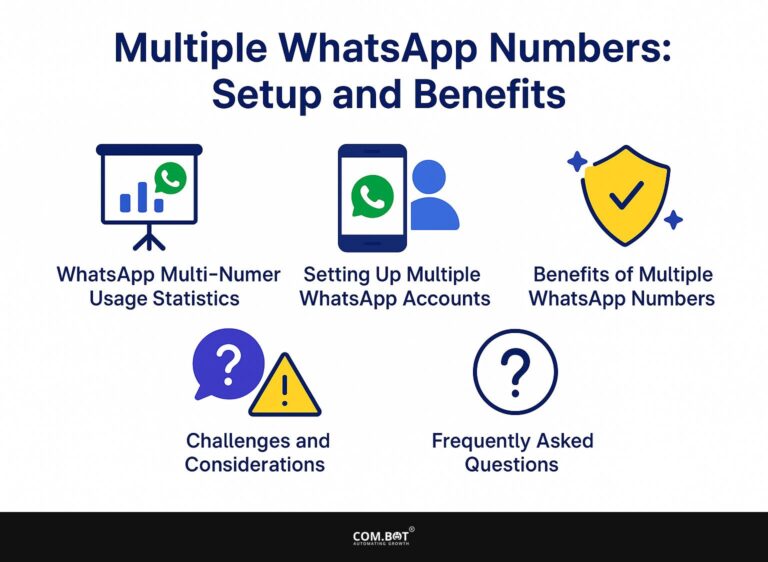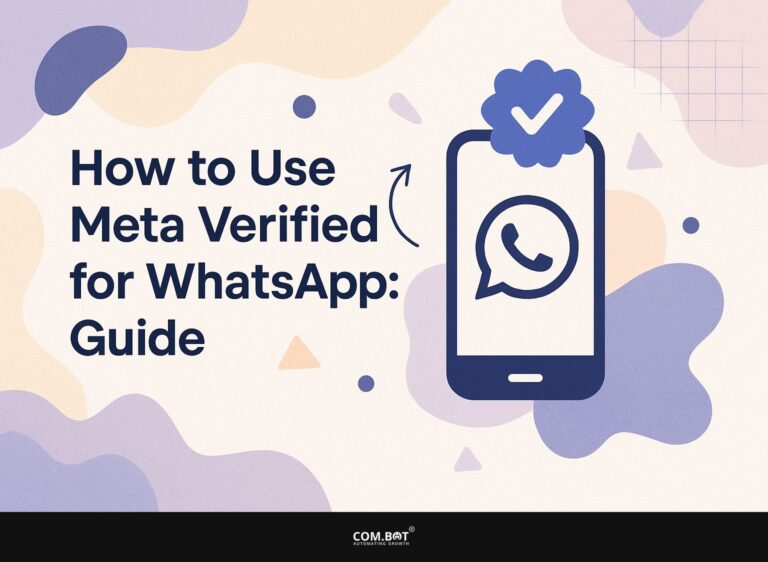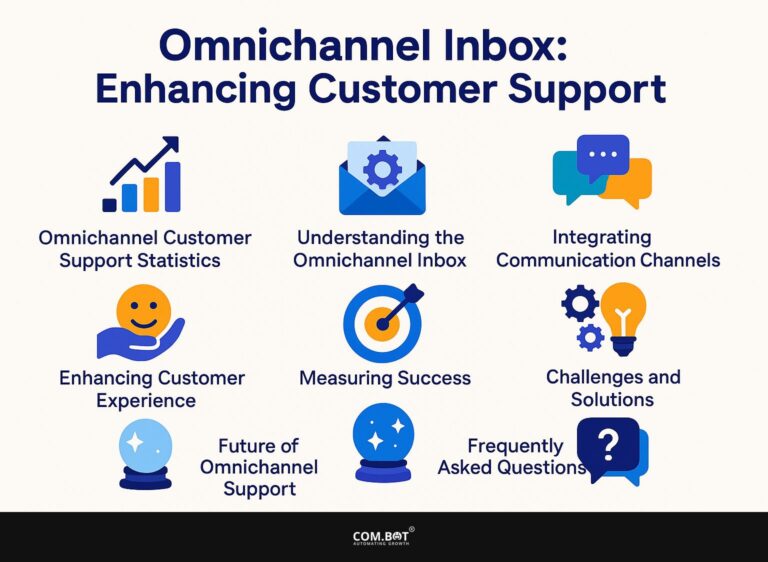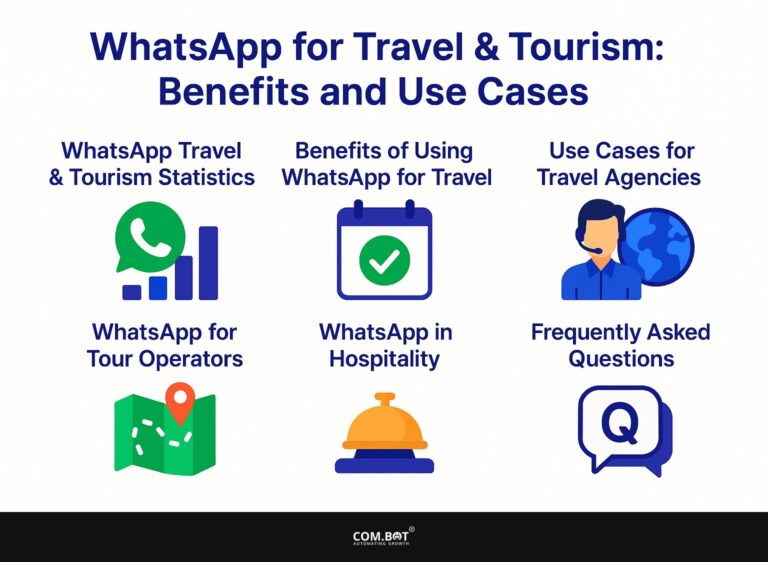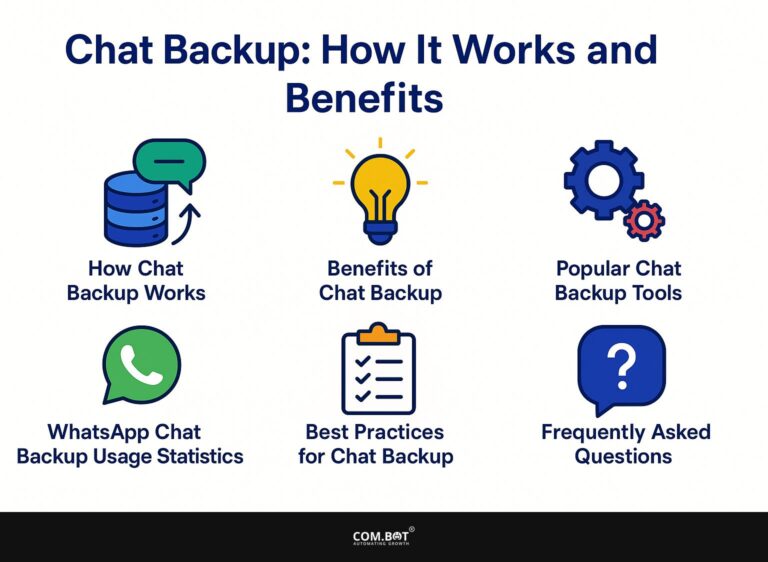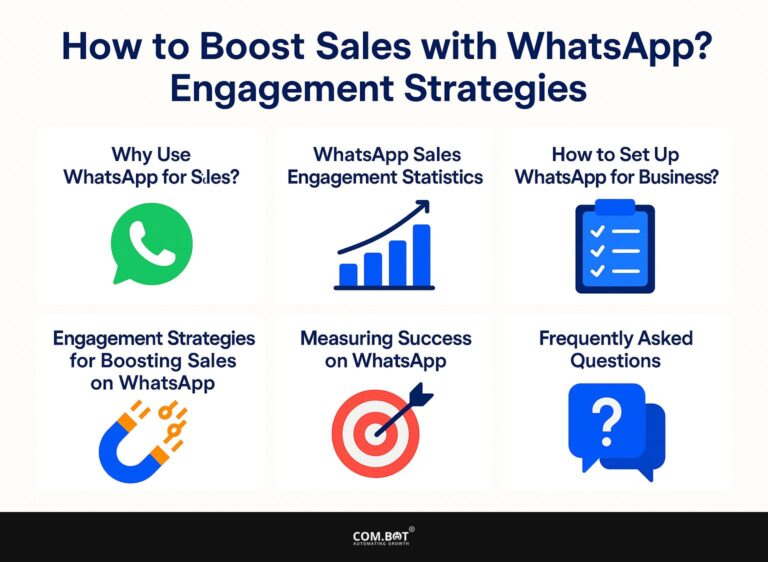WhatsApp API: Applications, Features, and Benefits for Various Industries
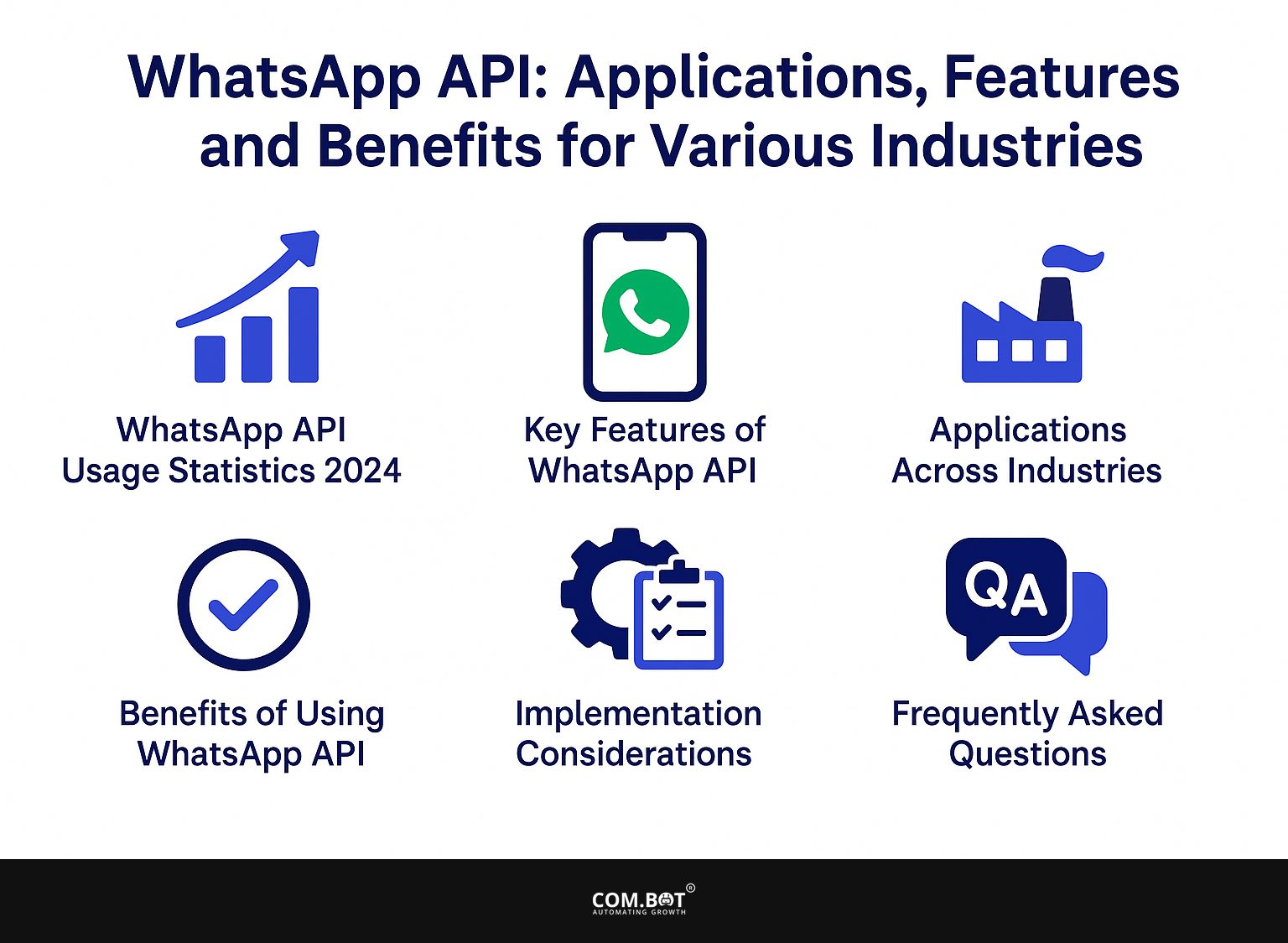
Use the WhatsApp API to improve your business communication. This tool changes how customers talk, providing smooth messaging and easy media sharing. Learn how businesses in e-commerce and healthcare use this API to improve customer interaction and make processes more efficient.
In this article, we’ll look at the main features, uses, and advantages of the WhatsApp API, showing how it can greatly help businesses improve their communication strategies.
Key Takeaways:
- WhatsApp API helps communicate with customers using its messaging, media sharing, and automated tools.
- Various industries, such as customer support, e-commerce, and healthcare, can benefit from using WhatsApp API for improved customer experience and increased engagement rates.
- Setting up WhatsApp API involves looking at tech needs, following rules, and keeping things secure to get the most benefits for companies.
- 1 WhatsApp API Usage Statistics 2024
- 1.1 WhatsApp Business API Impact: Open and Engagement Rates
- 1.2 WhatsApp Business API Impact: User Statistics
- 1.3 WhatsApp Business API Impact: Business and Marketing Usage
- 1.4 Effects of WhatsApp Business API: Regional Usage Information
- 1.5 WhatsApp Business API Impact: Consumer Preferences
- 1.6 2. Importance in Modern Communication
- 2 Key Features of WhatsApp API
- 3 Applications Across Industries
- 4 Benefits of Using WhatsApp API
- 5 Implementation Considerations
- 6 Frequently Asked Questions
- 6.1 1. What is WhatsApp API and how is it used in various industries?
- 6.2 2. What are the applications of WhatsApp API in e-commerce?
- 6.3 3. What features make WhatsApp API beneficial for healthcare organizations?
- 6.4 4. Can WhatsApp API be used to improve customer service in the hospitality industry?
- 6.5 5. What are the benefits of using WhatsApp API for marketing in the retail industry?
- 6.6 6. How does WhatsApp API help improve internal communication in businesses?
1. Overview of WhatsApp API
The WhatsApp API lets businesses send alerts, answer customer questions, and handle messages smoothly in the app. Using the WhatsApp API, businesses can set up features like automatic messages for helping customers, sending information about orders or appointments, and customized marketing strategies.
Tools like Twilio help businesses send messages smoothly, starting at $0.0075 each. Tracking customer activities is simpler because the API can work with current CRM systems like Salesforce. This helps to understand customer actions and make the service experience better.
WhatsApp API Usage Statistics 2024
WhatsApp API Usage Statistics 2024
Our new metric card design enhances user experience with smooth transitions and visually appealing elements (see also: WhatsApp Business: Features, Benefits, and Strategies).
WhatsApp Business API Impact: Open and Engagement Rates
WhatsApp Business API Impact: User Statistics
WhatsApp Business API Impact: Business and Marketing Usage
Effects of WhatsApp Business API: Regional Usage Information
WhatsApp Business API Impact: Consumer Preferences
The WhatsApp API Usage Statistics 2024 offers useful information on how the WhatsApp Business API is changing communication, involvement, and marketing methods worldwide. With a staggering 98% open rate and a 52.5% conversion rate WhatsApp is a strong tool for businesses that want to improve customer communication and increase sales.
User Statistics show WhatsApp’s extensive reach with 2.78 billion users globally, projected to grow to 3.14 billion by 2025. This widespread adoption results in an astonishing 100 billion messages sent daily, highlighting the platform’s integral role in personal and business communication.
Business and Marketing Usage data reveals that 5 million businesses use the WhatsApp Business API, gaining advantages from 2.5 billion hours saved and $11 billion in cost savings through chatbot integration. This efficiency highlights WhatsApp’s usefulness in making customer service easier and lowering operation expenses.
Regional Usage Insights emphasize WhatsApp’s influence in specific markets. In India, 80% of SMBs use WhatsApp, while 96% of business communication in Brazil occurs via the platform. In the UK, 73% of users talk to brands using WhatsApp, showing a regional shift towards messaging habits.
Consumer Preferences indicate a shift towards messaging as 67% of consumers prefer it over email or phone calls. Additionally, 83% of users are likely to engage with catalogues on WhatsApp, and 53% of interactions with brands drive purchases, showing how well the platform helps build stronger connections with customers and encourages them to buy.
Overall, the statistics show that WhatsApp is important in today’s communication methods. Its strong interaction rates, large number of users, and major cost reductions make it an essential tool for companies wanting to improve their customer connections and simplify processes as technology becomes more important.
2. Importance in Modern Communication
In the current busy environment, companies using the WhatsApp API experience a 70% rise in customer interaction through immediate communication. This shift towards instant messaging is evident, as 67% of customers prefer it over traditional channels like email and phone calls.
A retail company saw a 30% rise in sales after using WhatsApp for support and order updates. Tools like WhatsApp Business allow automatic replies and customized customer communication, simplifying the handling of questions.
Companies can also integrate chatbots, further enhancing responsiveness. With instant communication becoming the norm, embracing platforms like WhatsApp is essential for modern business success.
Key Features of WhatsApp API
The WhatsApp API includes strong features that improve business communication, such as messaging, media sharing, and automation tools. For an extensive analysis of this trend, our AI WhatsApp Bots guide examines how these tools can boost e-commerce sales and enhance overall business communication.
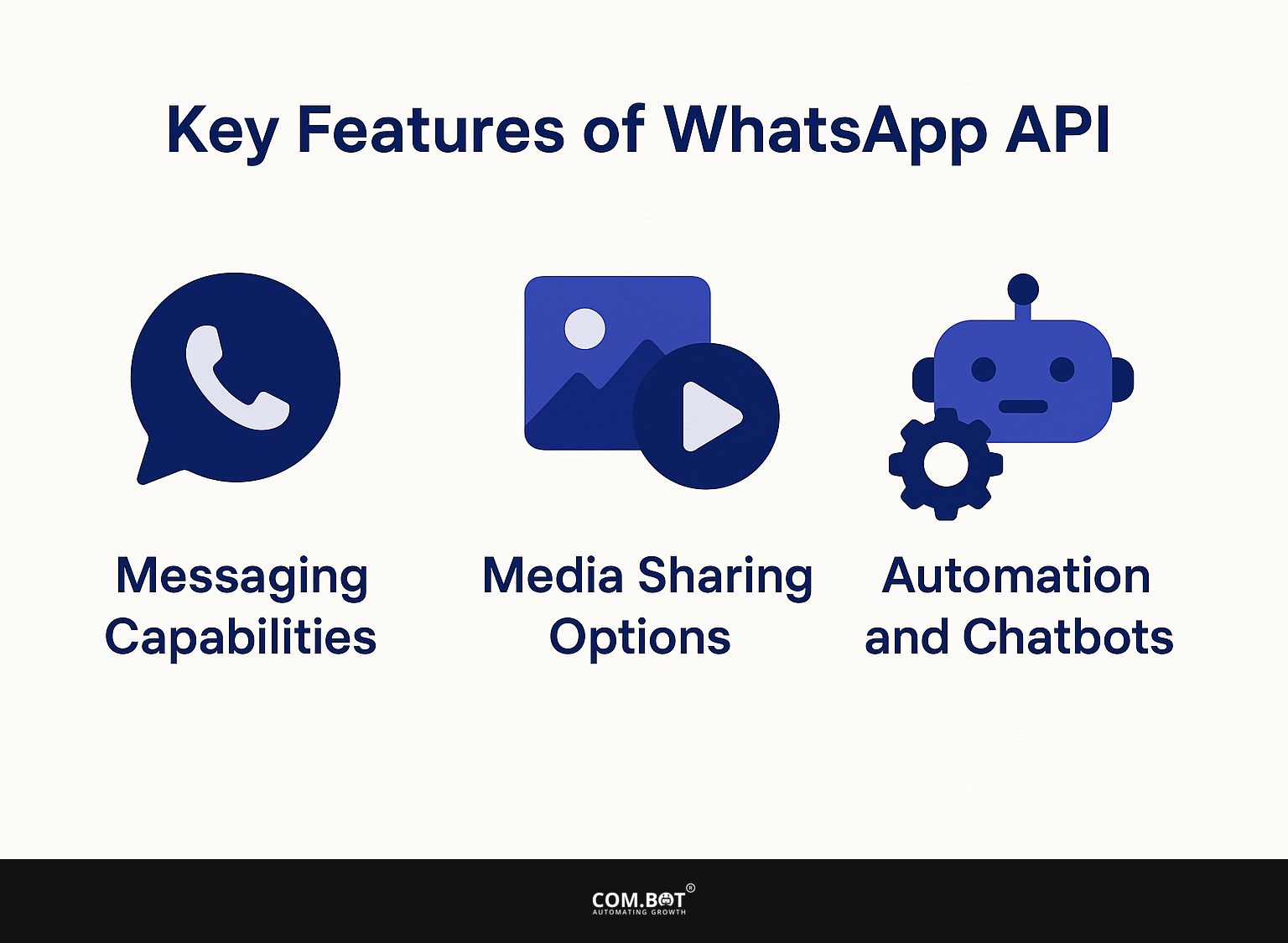
1. Messaging Capabilities
WhatsApp API supports both one-on-one and group messaging, allowing businesses to manage customer inquiries effectively in real-time. This functionality enables businesses to send various message types.
Text messages can give quick answers, and multimedia messages can include photos or videos to highlight products. Messages with templates are helpful for sending alerts such as appointment notifications.
A good example is BMW, which uses automatic messaging to give updates about services, keeping customers informed and interested. To add these features, businesses should connect the API with customer management tools like Zendesk or Salesforce for smooth communications.
2. Media Sharing Options
With WhatsApp API, businesses can share various media types, including images, videos, and documents, enhancing the customer experience. This capability allows e-commerce platforms to send product images and demo videos directly to customers, increasing engagement and driving purchases.
To manage these interactions well, using WhatsApp Business can be very helpful. This tool allows businesses to set up instant replies, sort chats, and even make customer service responses automatic.
For example, a clothing store could share a video displaying a new item and provide information about sizes, helping customers shop and find out more. Using these tools improves communication and builds better customer relationships.
3. Automation and Chatbots
Automation through chatbots on WhatsApp API can handle up to 80% of customer inquiries, significantly reducing response times. Businesses can implement chatbots using platforms like Dialogflow or ManyChat.
For instance, a retail company integrated a Dialogflow chatbot to manage FAQs and order status inquiries. As a result, they reduced their support response time from hours to mere minutes.
The process included organizing frequent customer questions and teaching the bot with an easy-to-use setup, allowing simple changes when new questions came up.
By using technology to handle these interactions, they improved efficiency and increased customer satisfaction, with a 30% rise in positive feedback.
Applications Across Industries
WhatsApp API is changing how businesses connect with their customers in different fields, from retail to healthcare, improving how they communicate. If you’re interested in leveraging WhatsApp for targeted marketing, explore our insights on how to deliver personalized promotions with WhatsApp API.
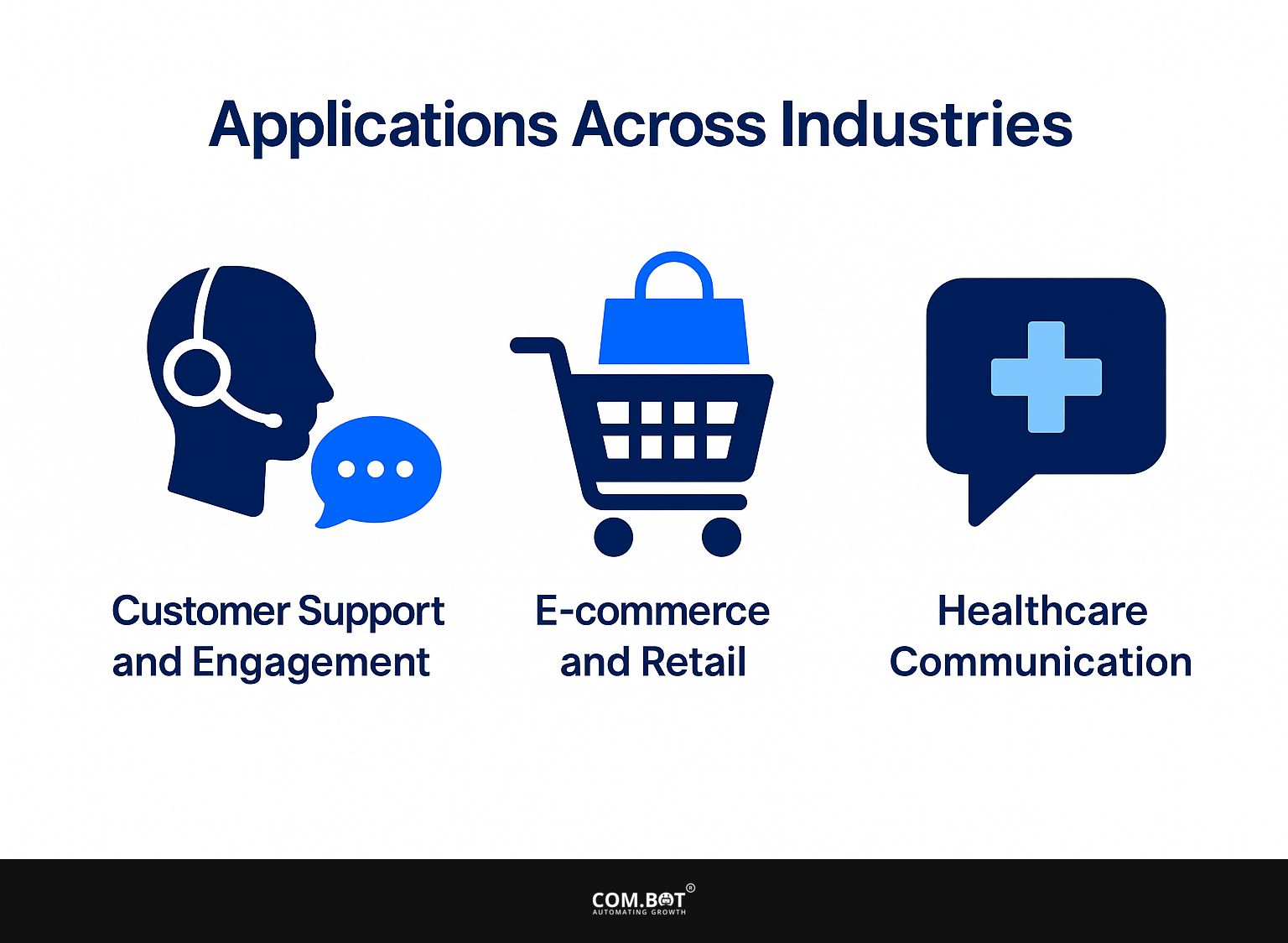
1. Customer Support and Engagement
Using WhatsApp API, businesses can provide instant customer support, leading to a 50% reduction in support response times. Businesses in different industries have effectively used WhatsApp for helping their customers.
For example, Salud Digna used WhatsApp to reply to patient questions, enabling them to provide answers to common questions instantly. This method made communication easier and improved patient satisfaction by offering quick responses. In the same way, online stores use WhatsApp to automatically send order updates to customers.
By using features like quick replies and chatbots, businesses can manage large numbers of questions easily while providing a personal touch to customer service.
2. E-commerce and Retail
E-commerce businesses using WhatsApp API see a 30% rise in sales by directly interacting with customers.
For example, an online clothing retailer integrated WhatsApp into their customer service strategy, allowing customers to inquire about products directly. They set up automatic order updates, which made replying to questions much faster.
A successful campaign used WhatsApp for special promotions, where customers got discount codes for a limited time. This increased interaction and led to quick sales. By using tools like Chatbot.com for automation and WhatsApp’s broadcast feature for promotions, businesses can improve customer interaction and build loyalty effectively.
3. Healthcare Communication
Healthcare providers using WhatsApp API can send messages reminding patients of their appointments, cutting down no-shows by up to 40%.
By streamlining communication, clinics like the Apollo Hospitals in India have improved patient engagement significantly, using WhatsApp for appointment confirmations and patient follow-ups. Similarly, options like the Mayo Clinic have adopted this approach, enabling patients to reach healthcare teams directly through the app.
This method allows patients to monitor their appointments and offers a friendly experience, enabling them to get answers to their questions promptly. These effective communication methods help make patient care faster and more interactive.
Benefits of Using WhatsApp API
Using the WhatsApp API improves customer experience and reduces business costs (learn more about transactional messaging uses to further enhance these benefits).
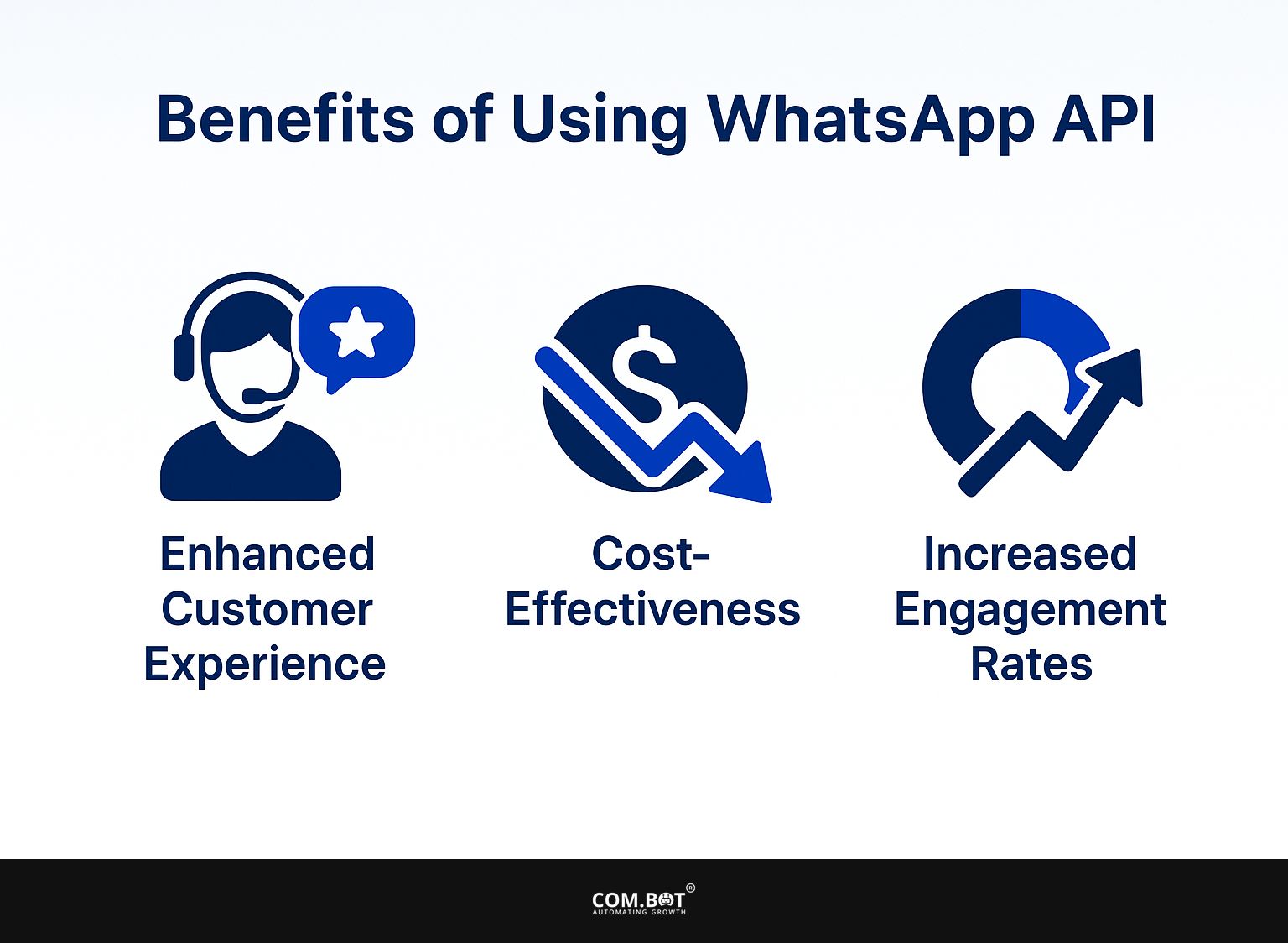
1. Enhanced Customer Experience
The WhatsApp API improves customer experience by allowing individualized communication, leading to an 80% satisfaction rate among users. Implementing the WhatsApp API allows businesses to tailor messages based on customer behavior.
For example, automatic notifications for appointments or customized deals can greatly increase interest. Companies like Zendesk reported a 50% increase in customer retention rates after using WhatsApp for support. Chatbots help quickly answer usual questions, so customers get fast help.
This individual interaction quickly takes care of what customers need and builds loyalty by offering a more interesting and helpful experience.
2. Cost-Effectiveness
Companies say they save up to 25% on regular customer service expenses by using WhatsApp API for automatic communication.
For instance, a retail company previously invested $100,000 annually in a call center. By integrating WhatsApp API, they reduced this to $75,000 while enhancing support efficiency.
Tools such as Twilio for connecting WhatsApp and Chatbot systems help handle quick customer questions, letting agents deal with more difficult tasks.
A local restaurant, for example, reported answering 80% of inquiries automatically, resulting in a 30% increase in customer satisfaction and a 20% decrease in staffing costs. Such real-world applications highlight the clear financial benefits of transitioning to the WhatsApp API.
3. Increased Engagement Rates
Companies implementing WhatsApp API experience up to a 70% increase in customer engagement through interactive messaging.
For this, companies should use WhatsApp to interact with customers in a personal way. For example, brands like Wish have used it for order confirmations and support, significantly reducing response times.
Use tools like Twilio for simple API connections, and try chatbots like Landbot to handle FAQs, providing round-the-clock service. Monitoring things like reply speed and interaction levels can improve plans. Quick replies and engaging elements build trust and lead to more conversions.
Implementation Considerations
To effectively use the WhatsApp API, focus on technical specifics, adhere to guidelines, and maintain security. For those looking to enhance their application, a key strategy is implementing account verification, which is explored in depth in our guide on How to Implement Account Verification with WhatsApp API.
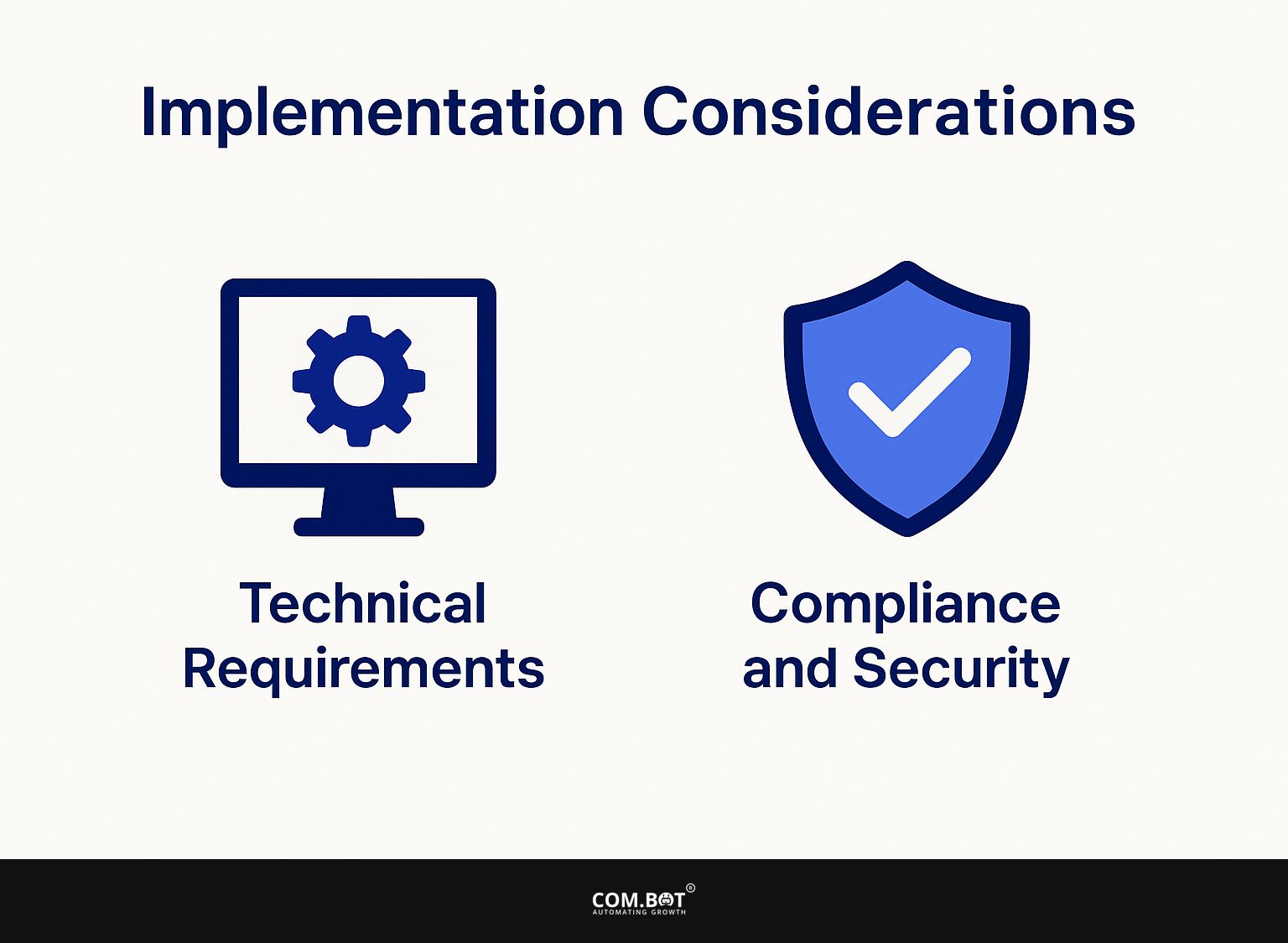
1. Technical Requirements
Integrating WhatsApp API necessitates a verified business account and a backend server to handle API requests effectively. To set up the WhatsApp API, make sure your server has at least 2 GB of RAM and Docker installed to package your application.
Familiarity with programming languages like Node.js or Python is essential for integrating the API and performing operations such as sending messages or managing user sessions.
Use tools like Postman to test API endpoints quickly, helping you find connection problems or check parameters before going live. This preparation will facilitate a smooth integration process.
2. Compliance and Security
Following data protection rules, like GDPR, is important when using WhatsApp API to protect customer data. To handle legal matters successfully, learn about the specific laws that apply to your area.
In Europe, GDPR mandates clear consent for data collection and the right to access personal information, requiring transparent data handling practices.
In the USA, follow the CCPA rules that focus on protecting users’ privacy rights. Best practices include:
- Encrypting sensitive communications
- Regularly updating security protocols
- Performing audits to find possible weaknesses
Using tools such as privacy impact assessments can help meet legal requirements and increase your customers’ trust.
Frequently Asked Questions
1. What is WhatsApp API and how is it used in various industries?
WhatsApp API is a set of programming instructions that allows businesses to integrate WhatsApp into their communication systems. It is used in different fields like online shopping, medical care, and hotels to improve customer service and make business activities more efficient.
2. What are the applications of WhatsApp API in e-commerce?
WhatsApp API can be used in e-commerce to send order updates, delivery notifications, and customer support messages to customers. The app allows users to get personalized product recommendations and buy them directly within the app.
3. What features make WhatsApp API beneficial for healthcare organizations?
WhatsApp API provides safe and private messaging, making it a good option for healthcare organizations to talk with patients and exchange confidential information. It notifies about appointments, provides online consultations, and informs patients about their medication timings.
4. Can WhatsApp API be used to improve customer service in the hospitality industry?
Yes, WhatsApp API can be used to send booking confirmations, flight updates, and hotel check-in information to guests. It gives personalized ideas and quick answers to guest questions, making their experience better.
5. What are the benefits of using WhatsApp API for marketing in the retail industry?
WhatsApp API allows for direct communication with customers, enabling retailers to send targeted promotions, discounts, and loyalty rewards. It also lets businesses gather customer feedback instantly and offer customized support, resulting in happier customers who are more likely to stay.
6. How does WhatsApp API help improve internal communication in businesses?
WhatsApp API provides group messaging and broadcast functions, which help businesses communicate internally. It also allows for file sharing and task management, streamlining team collaboration and improving overall productivity.
